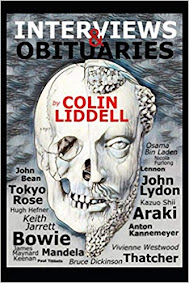 |
| . |
The Labour Party is not interested in Tony Blair – its disgraced ex-leader, who is widely regarded as a de facto war criminal running around free despite his part in the NeoCon Wars of the early 21st century – but Tony Blair is intensely interested in the Labour Party. In fact, the lying "humanitarian" war-monger and failed Middle-Eastern peace envoy (his last job) just won't shut the fuck up (even when he's not being paid enormous fees).
Here he is in just one of several Labour-loathing dailies, delivering a broadside to his old party as it struggles to find a new leader from a very limited pool of talent to fill the rather small gap left by the departure of Ed Miliband:
Labour faces 20 years out of power if it moves further towards the "leftist platform" of the 1980s, Tony Blair warned as he mounted a bitter attack on the hard-left leadership candidate Jeremy Corbyn.Despite the widespread disgust and derision that his name now evokes, Blair seems to be under the illusion that he is somehow a respected elder statesman of British politics, whose views on the Labour leadership contest carry weight with the rank and file. Ludicrously, he still thinks there is some mileage left in presenting himself as a "man of principle" uninterested in mere political power:
Mr Blair said that those who claimed that their heart was with Mr Corbyn should "get a transplant" as he dismissed the lifelong socialist as the "Tory preference" for the leadership contest.
In his most significant intervention since the General Election, Mr Blair said that he would not choose to adopt an "old-fashioned" left-wing approach even if it could guarantee victory.
He also launched a scathing critique of Ed Miliband's leadership, describing Labour's election approach as old-fashioned enough to be from the Star Trek era and adding that it was "out of the playbook of the 1980s".
He highlighted the scale of the challenge facing Labour by comparing the party's defeat at the General Election to the early 1980s, when the late Baroness Thatcher won and the party lost four elections in a row.
He said that Labour must not "move back" and needs to resist the "easy and enormously tempting urge" to become a "party of protest" rather than a credible opposition.
He said: “If we do, then the public won’t vote for us, not because our thoughts are too pure, but because they’re too out of touch with the world they live in,” he said.
While there is a certain comic value in observing Blair popping up, not so much like a ghost at a feast, but more like a zombie at a watered-down gruel tasting contest, he also represents the central paradox of the Labour Party: it is a party that can only ever get elected if it is hijacked by the kind of glib, soulless sociopath that Blair exemplified. The same thing to a lesser degree can be said about the Conservative Party, and, indeed, about most big political parties, but it is especially and painfully true of the Labour Party.
 |
| This is what Labour victory looks like. |
Even when Britain was an industrial economy – something that definitely ended in the 1980s – the Labour Party always had to stretch to gain power and make severe comprises with its inherent nature.
The only real, natural Labour government was the 1945 Attlee government, and that was due to the distorting effects on British society of six years of total war.
After that, English small-C conservatism started reasserting itself, meaning that the Labour Party had to continually tack to the center much more severely than even the Conservative Party did.
The only real, natural Labour government was the 1945 Attlee government, and that was due to the distorting effects on British society of six years of total war.
After that, English small-C conservatism started reasserting itself, meaning that the Labour Party had to continually tack to the center much more severely than even the Conservative Party did.
While the Tories had their reluctant right wing in the 1922 Committee, it was never on the same scale as the Labour Party's militant left wing. The real reason for this was that back in the early decades of the 20th century, the Labour Party had had to existentially define itself as socialist in order to displace the Liberal Party among trade unionists and other important elements of the working class. But this same identification with socialism also meant that it went into any race against the Conservative Party with a severe handicap.
This became increasingly apparent throughout the 1950s and 1970s (the 1960s may have been something of an exception although the same trends are there under the surface), and reached toxic levels from 1979 onwards, when, as Blair points out, the Conservative Party won four elections in a row – with, it should be pointed out, an extremely unappealing leader. The fact is that the Tory Party was and is a better fit with the essence of Middle England.
In short, the more the Labour Party is itself and the more sincere it is as a party, the more doomed it becomes. This explains the whole career of Blair.
New Labour, as the party was dubbed during Blair's ascendancy, was not an example of "modernization" (a term often used and essentially meaningless), but simply a case the party being distorted from its socialist essence, while temporarily hiding this distortion from most of the members.
New Labour, as the party was dubbed during Blair's ascendancy, was not an example of "modernization" (a term often used and essentially meaningless), but simply a case the party being distorted from its socialist essence, while temporarily hiding this distortion from most of the members.
Tony Blair's hijacking of the party, with his sleazy economic centrism and globalist subservience to the USA and the EU, was superficially successful. Blair won three elections in row. Labour even had the chance to socially engineer the country's population in a more leftist direction through mass immigration. But this success could only be achieved at the cost of downplaying, sidetracking, and outright denial the party's socialist soul.
 |
| Sandwich-board man elected leader of Labour Party? |
Given the state of the Labour Party post-Blair, Miliband represented perhaps the most pragmatic approach possible. But this effort was derailed both by Miliband's unfortunate appearance, which increasingly grated with the public as they were exposed to him during the election campaign, and also by the political dynamic created by last year's Scottish independence referendum, the rise of the SNP in Scotland, and a reaction against this among English voters.
The Labour Party can never stomach another Blair, so someone like Miliband (only better looking) is perhaps the best they can hope for. Among the current field of candidates that would perhaps be someone like Andy Burnham, although he is also signally deficient in charisma. (The two female candidates are shrill and irritating, and won't wear well with the public.)
Unfortunately for the party, it has chosen its post-election-defeat moment to resonate with itself more than usual, with the result that the runaway favourite to become next Labour leader is now Jeremy Corbyn, an out-an-outLeft-winger Communist, effectively Britain's answer to Alexis Tsipras but old enough to be Tsipras's father. While a bit of political soul-searching may be therapeutic for the Labour Party membership, and Corbyn is a nice grandfatherly figure, his election will definitely speed up the party's descent into the dustbin of history.
Unfortunately for the party, it has chosen its post-election-defeat moment to resonate with itself more than usual, with the result that the runaway favourite to become next Labour leader is now Jeremy Corbyn, an out-an-out
Since the 18th century, the UK has operated as a two-party system. Labour's unwillingness to play its part – largely a response to the moral vacuousness of Blair – should be signalling to parties like UKIP that a major vacancy may be opening up in English politics.
Connected content:
The Miliband Masquerade
Lessons from the UK Elections
































No comments:
Post a Comment
Your comment will appear after it has been checked for spam, trolling, and hate speech.